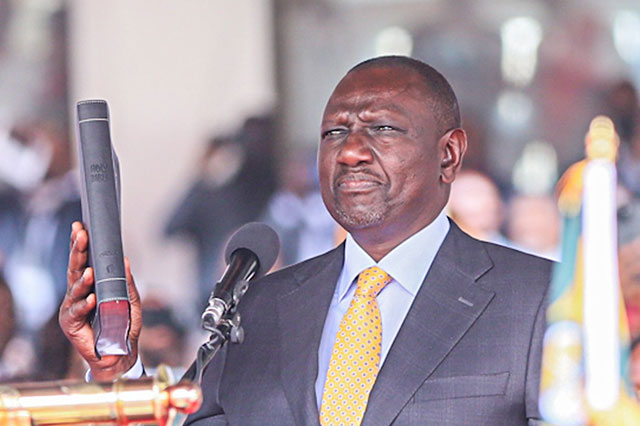Nairobi – William Ruto pledged to work for all Kenyans after he was sworn in as president at a pomp-filled ceremony on Tuesday, five weeks after his narrow victory in a bitterly-fought but largely peaceful election.
Tens of thousands of people joined regional heads of state at a packed 60 000-seat stadium in Nairobi to watch him take the oath of office, with many spectators clad in the bright yellow of Ruto’s party, cheering loudly and waving Kenyan flags.
“I will work with all Kenyans irrespective of who they voted for,” the 55-year-old said in his inauguration speech, vowing to unite the polarised nation and announcing a series of measures to tackle its economic woes.
ALSO READ | William Ruto: Kenya’s ‘hustler-in-chief’ president
“In this process we have demonstrated the maturity of our democracy, the robustness of our institutions and the resilience of the Kenyan people.”
The rags-to-riches businessman described his swearing-in as Kenya’s fifth post-independence president as a “moment like no other,” adding: “Today, I want to thank God, because a village boy has become the president of Kenya.”
A notoriously ambitious politician who has been deputy president since 2013, Ruto beat his rival Raila Odinga – who had the backing of now former president Uhuru Kenyatta – by less than two percentage points in the August 9 poll.
But the Supreme Court on September 5 unanimously upheld his victory, dismissing his opponents’ claims of fraud and mismanagement.
‘Political maturity’
African Union Commission chair Moussa Faki Mahamat, who was at the ceremony, hailed the peaceful transfer of power in a post on Twitter, saying it was “an enduring feature of the country’s political maturity”.
Ruto’s rise has been closely watched by the international community, which looks to Kenya as a reliable and stable democracy in a turbulent region.
Foreign allies and independent observers praised the conduct of the vote, which was mostly free of the violence that has marred past elections in the country of 50 million people.
Before Tuesday’s ceremony began, several people were injured as crowds tried to force their way into the stadium. Television footage showed dozens of people falling on top of one other in a crush at one entrance gate.
ALSO READ | William Ruto sworn in as Kenya’s president after divisive poll
Ruto, who once sold chickens on the roadside in what is now his Rift Valley stronghold, had painted the election as a battle between ordinary “hustlers” and the elite Kenyatta and Odinga “dynasties” that had dominated Kenyan politics for decades.
But he faces a daunting task ahead to unite the country after a bruising and divisive election campaign, and ease the hardship of ordinary Kenyans who are struggling to make ends meet as prices for basic goods soar.
In his speech, Ruto pledged to stem the rising tide of youth unemployment, provide resources to help ease those confronted by a punishing drought, and stabilise Kenya’s public finances – which are creaking under the weight of a $70-billion debt mountain.
Ruto said he would establish a 50-billion-shilling ($415-million) “hustler fund” to provide loans to small enterprises to help drive growth, while making Kenya more business-friendly.
‘Fiscal cliff’
Kenyatta, who in a stunning turn of events reached a pact with his longtime rival Odinga in 2018 and banished his deputy Ruto to the sidelines, had promised a smooth transfer of power.
But the 60-year-old had pointedly failed to publicly congratulate his successor for several weeks, finally shaking Ruto’s hand at a meeting at the presidential residence on Monday.
And Ruto’s new deputy Rigathi Gachagua took potshots at Kenyatta during the inauguration ceremony, saying the new administration had inherited a “dilapidated economy”.
Odinga, meanwhile, turned down an invitation to attend the event, charging that the election commission did not conduct a “free and fair” poll.
ALSO READ | William Ruto to be sworn in as Kenya’s president after divisive poll
Oxford Economics said Ruto’s ascendancy was “momentous” in that he was not part of a political dynasty and had campaigned on socio-economic rather than ethnic divides in the multi-tribe nation.
His inauguration marks the end of Kenyatta’s near decade in power, and one of the rare occasions his powerful family has not been at the apex of Kenyan politics.
“Once the election euphoria subsides, Mr Ruto will find himself tasked with uniting a divided Kenya and navigating the government away from a fiscal cliff,” Oxford Economics said in a note.
Ruto, whose new presidential coat of arms bears his party symbol, the humble wheelbarrow, will get a salary of about $144 000 a year as well as all the trappings of presidential office.
Follow African Insider on Facebook, Twitter, and Instagram
Picture: Twitter/@MusaliaMudavadi
Source: AFP
For more African news, visit Africaninsider.com


